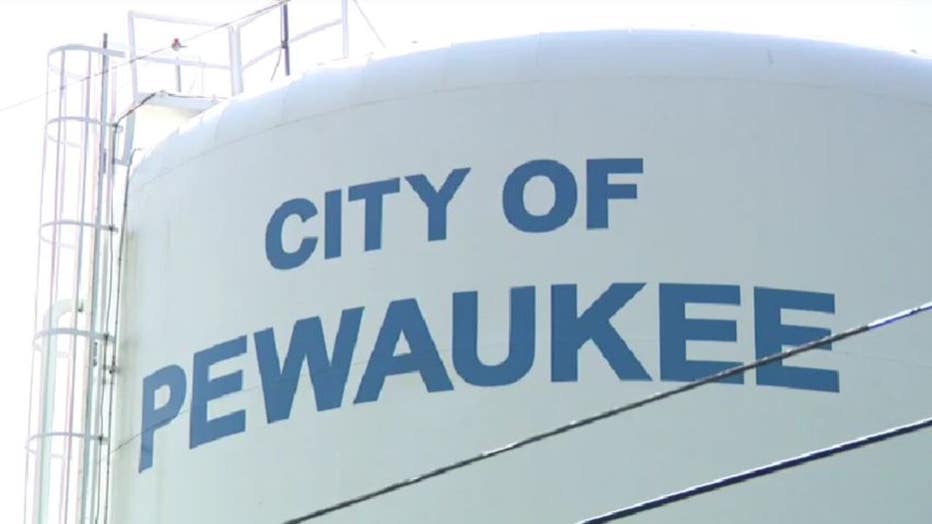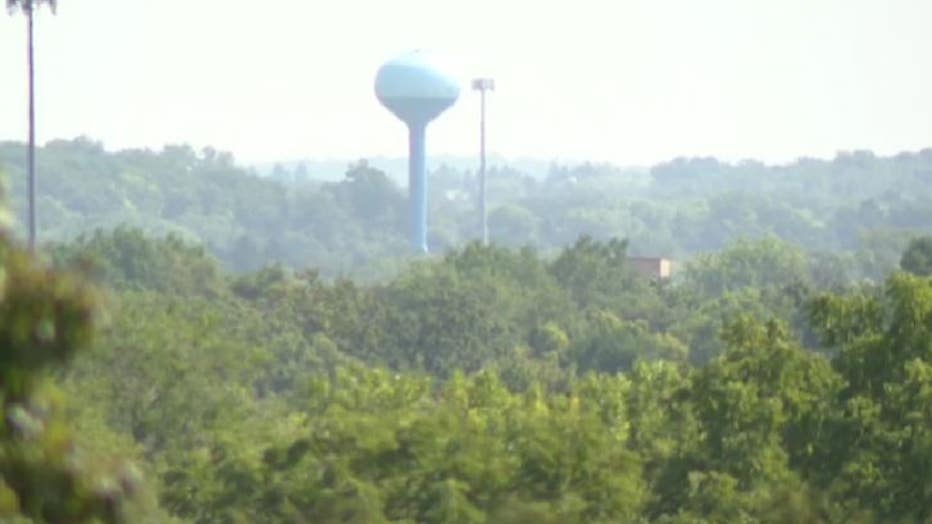Pewaukee PFAS, 2 wells exceed 'hazard index'
Pewaukee PFAS, 2 wells exceed 'hazard index'
PFAS were found in Pewaukee in two of the 12 drinking water wells. The Wisconsin Department of Natural Resources says PFAS can cause thyroid or heart issues, cancer or even developmental delays.
PEWAUKEE, Wis. - PFAS were found in Pewaukee in two of the 12 drinking water wells. The Wisconsin Department of Natural Resources says PFAS can cause thyroid or heart issues, cancer or even developmental delays.
Pewaukee leaders said the water is still safe, but long-term solutions will be expensive.
While out for a walk on Tuesday morning, Aug. 29 with her dog, PFAS in her drinking water was the last thing on Mary Jo Powers' mind.
"I have no idea what that is," said Powers.

Two of Pewaukee's 12 wells were found to exceed a "hazard index" for the chemical.
"You can either turn off the wells if you have capacity in order to do that, or you send out a notice to say, ‘We’re going to continue using this well, but you have to understand there’s a health hazard out there,’" said Magdelene Wagner, director of Public Works.
Wagner said when they tried taking the wells offline, there wasn’t enough water for fire protection. Wagner stressed the water is still safe to drink.
"There’s a lot more studying that needs to be done on this chemical in order to determine the true health risks associated with it and how much that risk is," said Wagner.

The man-made chemical is resistant to heat, water and grease. It’s found in things like non-stick pans and stain-resistant carpets.
Pewaukee leaders are looking into ways to filter PFAS out of the wells.
"Certainly is expensive," said Jesse Jensen, Wisconsin DNR, noting the cost has the potential to be in the thousands or millions.
The DNR started requiring communities to test for PFAS in 2023.
SIGN UP TODAY: Get daily headlines, breaking news emails from FOX6 News
Jensen said only Saukville, West Bend, Mukwonago and the village and city of Pewaukee exceeded Wisconsin Department of Health Services recommended groundwater standards for PFAS in southeastern Wisconsin.
Your water could be next because of shifting guidelines.
"EPA, the federal side of things, is looking at even tighter regulations on these chemicals," said Jensen.
Powers said she wants to know everything she can about PFAS and the plan to drain it from her drinking water.
"Definitely would need to clear it up no matter how much it cost," said Powers.

Pewaukee leaders stressed the water is still safe to drink and has not exceeded any guidelines for drinking water standards. Even so, DHS is recommending in a letter to residents that they limit water consumption as a precaution.
The Wisconsin budget includes $125 million for PFAS removal, with politicians arguing over how that would work. There's a Republican bill outlining where the money should go, including grant programs, but environmental groups say it would weaken the state's authority to enforce cleanup.

PFAS information from the Wisconsin DNR
WHAT IS PFAS? WHERE DOES IT COME FROM?
- PFAS stands for "Per- and Polyfluoroalkyl Substances"
- Large group of human-made chemicals that have been used in industry and consumer products worldwide since the 1950s.
- Examples include products such as: Non-stick cookware Fast food wrappers Stain-resistant sprays Certain types of firefighting foam
- Non-stick cookware
- Fast food wrappers
- Stain-resistant sprays
- Certain types of firefighting foam
- What makes them unique is their grease, water and heat-resistant properties… which also makes them long-lasting in our environment.
WHAT IS THE HAZARD INDEX?
- PFAS are commonly found in mixtures in the environment and many of these chemicals can impact our health in the same ways.
- That is why the Wisconsin Department of Health Services developed the tool referred to as the "Hazard Index" as a way to assess the health risk from mixtures of PFAS.
*To calculate HI, we compare the levels of each PFAS in drinking water to an available health guideline.
*If the HI is 1 or greater, you should take action to reduce your PFAS exposure.
HOW IS THE DNR MONITORING FOR PFAS?
- In February 2022, the Wisconsin Natural Resources Board approved a drinking water standard of 70 ppt for PFOA and PFOS individually and combined.
- In 2023, the department required the sampling of several different PFAS compounds at both municipal water systems as well as other smaller types of public water systems.
PEWAUKEE PFAS:
- The City of Pewaukee and Village of Pewaukee are not in violation of any federal or state drinking water regulations; however, both have recently found PFAS levels in their municipal water supplies in excess of the Wisconsin Department of Health Services recommended standards for drinking water.
- When situations like this occur, the DNR works with communities to:
- Notify their customers
- Take voluntary interim actions that can reduce PFAS exposure to customers
- Pewaukee City has been an excellent partner to work with and has been working proactively to protect and inform their customers.
- Pewaukee City is working diligently on long-term treatment options for these wells.
- Impacted communities like Pewaukee will likely be eligible for Bipartisan Infrastructure Law funding – both as grants and loans - that are specifically designated to help fund communities to take actions to reduce exposure.
MUNICIPAL COMMUNITY PUBLIC WATER SYSTEMS IMPACTED BY PFAS IN WISCONSIN’S SOUTHEAST REGION:
- West Bend
- Saukville
- Mukwonago
- Pewaukee Village
- Pewaukee City
IS PEWAUKEE WATER SAFE TO DRINK?
- Right now, DHS is recommending that residents limit their consumption of Pewaukee City water.It's OK to use water for other purposes like handwashing and showering.
- It's OK to use water for other purposes like handwashing and showering.
- In the short term, residents can protect themselves by either drinking: Bottled Water Filtered water from a pitcher, sink or whole-house filter system with certified filter technology. A granular activated carbon (GAC) filter that meets ANSI/NSF Standard 53 Reverse osmosis (RO) filter that includes a GAC component that can filter out PFAS.
- Bottled Water
- Filtered water from a pitcher, sink or whole-house filter system with certified filter technology. A granular activated carbon (GAC) filter that meets ANSI/NSF Standard 53 Reverse osmosis (RO) filter that includes a GAC component that can filter out PFAS.
- A granular activated carbon (GAC) filter that meets ANSI/NSF Standard 53
- Reverse osmosis (RO) filter that includes a GAC component that can filter out PFAS.
- The City of Pewaukee is evaluating long-term solutions.
- Boiling water does not remove PFAS.

